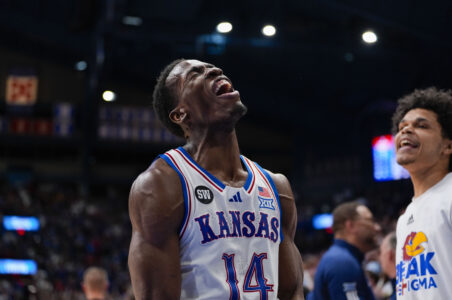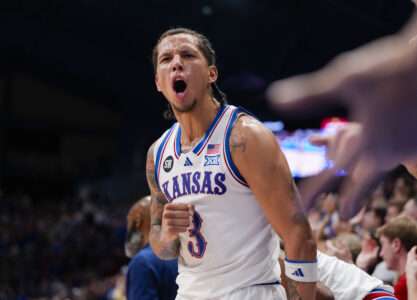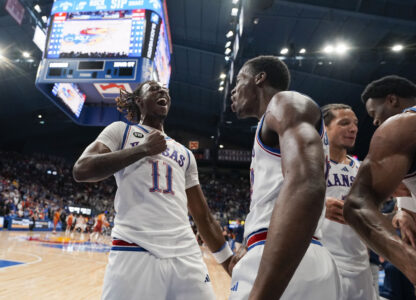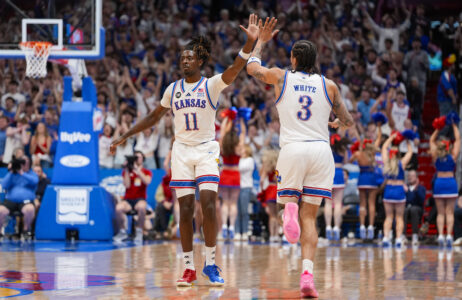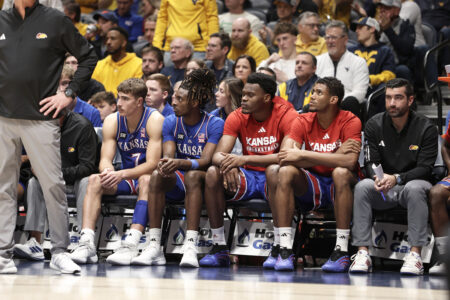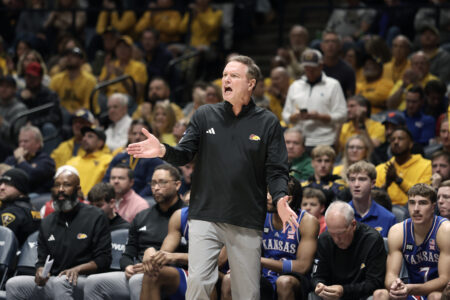Moore and Mayo’s post-career portal entries are testament to strange state of college sports
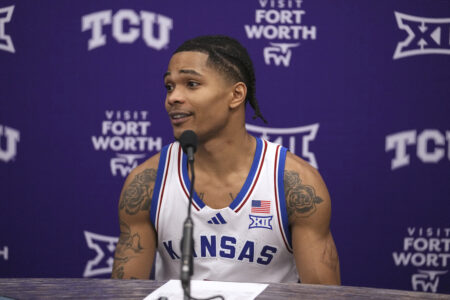
photo by: AP Photo/Tony Gutierrez
Kansas's Shakeel Moore responds to questions during a post game news conference following an NCAA college basketball game against TCU in Fort Worth, Texas, Wednesday, Jan. 22, 2025.
At 3:29 p.m. on Monday, On3 was first to report that Kansas guard Shakeel Moore had entered his name in the transfer portal; by 4:41 p.m., a KU Athletics spokesperson had told the Journal-World that Moore was removing it.
All the while, Moore lacked a meaningful ability to transfer anywhere anyway.
He had already played five full seasons of college basketball, without any eligibility remaining: 25 games at N.C. State in the 2020-21 season, which doesn’t count due to the COVID-19 pandemic, but then 34 at Mississippi State in 2021-22, 32 in 2022-23, 33 in 2023-24 and most recently 20 at KU in 2024-25.
There was no known extant waiver that would have given Moore a sixth year.
Nor is there one for fellow former KU guard Zeke Mayo, with four years of significant action under his belt and fresh off the Portsmouth Invitational Tournament for graduating seniors, who followed suit and said he too was entering the portal on Monday night.
Sure, Moore struggled with soreness from a broken foot all through his lone season at KU, but he still played in 59% of the Jayhawks’ games — about double the 30% that many schools cite as a benchmark for a medical waiver — and even came back for one last game in the NCAA Tournament after missing seven straight, which would certainly hurt any case for additional eligibility.
The reality is that Moore and Mayo weren’t the only athletes entering the portal without a leg to stand on. Basketball players across the country have been doing it since the early stages of this year’s spring transfer window. Wake Forest center Efton Reid III — 34 games at LSU, 25 at Gonzaga, 59 across two seasons at Wake — did so on March 31. But the frequency of these entries has quite apparently intensified in the days leading up to the portal’s closure on Tuesday.
Clemson’s Ian Schieffelin, veteran of 134 games in four years with the Tigers, whose portal entry preceded Moore and Mayo’s on Monday, wrote on X, “While I am (pursuing) my options on the professional level I have been advised, due to pending NCAA cases, to enter the portal on the very outside chance more eligibility is allowed.”
Mayo used a similar phrasing in a post of his own: “Due to the pending NCAA rules, I have been advised to enter my name into the transfer portal. I am still focused on pursuing professional options.”
In the absence of more concrete information on Moore’s motivations — efforts to reach those close to Moore were unsuccessful on Monday afternoon — it wouldn’t be a surprise if he was planning to take the same approach, at least for about an hour. It would certainly have made financial sense for him and Mayo, like so many of their peers, to do so just in case, especially with how much money teams are pouring into college basketball payrolls right now.
Broadly speaking, as these portal entries reveal, the state of college athletics is so fluid in the days and weeks leading up to official approval of the House v. NCAA settlement, and realistically will continue to be afterward, that just about anyone might think they could have a case for more eligibility.
And why wouldn’t they think so? College basketball programs had approached the 2023 offseason thinking players who had transferred more than once wouldn’t be eligible to play right away. Then that December, as a result of various legal actions, these multi-time transfers were able to take the floor immediately. Surprise!
A year later, teams learned midway through the season — again as a result of a court decision — that anyone on their rosters who had started at a junior college and who would otherwise be done after the 2024-25 campaign would instead get another year of eligibility. That’s now how David Coit was able to transfer to Maryland for a fifth year and how KU got Melvin Council Jr. from St. Bonaventure.
Except it wasn’t in fact “anyone” who had started at a junior college. Certain players like Rutgers football safety Jett Elad, who started his college career in 2019 and redshirted before going on to a JUCO, found that because they were outside the NCAA’s five-year eligibility clock — unlike the likes of Coit, Council or the original plaintiff who prompted this waiver, Vanderbilt quarterback Diego Pavia — the JUCO waiver wouldn’t work for them. Now Elad is in court arguing for his own interests, essentially based on a “once-in-a-lifetime” $500,000 contract he would miss out on if he can’t play, and if he wins a whole new class of players could suddenly potentially return to action.
That doesn’t necessarily mean much for Moore or Mayo or Schieffelin or their ilk. The five-year clock (i.e., pending circumstances like military or religious service, you have five years within which to complete your college athletics career once you start it) is different than the four-year rule (i.e., notwithstanding redshirts and the COVID waiver, you can take part in four seasons of competition), and if Elad gets his five-year clock waived it doesn’t mean others will get the four-year eligibility rule waived.
At least not yet. Jon Rothstein of College Hoops Today wrote on X on Monday, amid the odd string of portal entries, “NCAA members will not discuss whether or not players will receive five years of eligibility moving forward via legislation until after a final decision on the House Settlement has been made, per an NCAA official.”
It kind of feels like eligibility is going to extend beyond four years for a lot of players whether the NCAA likes it or not. Wisconsin cornerback Nyzier Fourqurean was able to convince a court that a season he spent playing not junior college but NCAA Division II football in 2021, a year derailed by the death of his father, should not count toward his eligibility, and that by making it count the NCAA would be depriving him of name, image and likeness opportunities. That decision is under appeal.
Who’s to say other Division II athletes can’t argue that, for economic reasons, their years shouldn’t count against Division I eligibility? To tread carefully down the slippery slope for just a moment, who’s to say players can’t argue that years spent playing at mid-majors illegally prevented them from making high-major money?
As Fourqurean himself recently said, per BadgerExtra, “it’s very specific to my situation for the 2021 year when my dad passed and everything. So I think it’s very specific to me, so I don’t think it very much benefits everybody, but I guess in a way you could think that it opened up doors for guys to try and cling on to something.” There is indeed a lot of clinging on happening around college sports.

Kansas guard Zeke Mayo (5) takes a question from reporters along side center Hunter Dickinson during a press conference following the NCAA Tournament selection show on Sunday, March 16, 2025 at Allen Fieldhouse. The Jayhawks will take on the Arkansas Razorbacks in the first round in Providence, Rhode Island. Photo by Nick Krug


